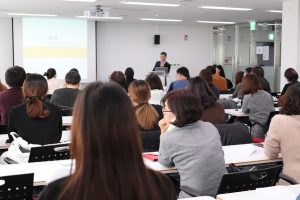憧れのNYコロンビア大学初受講!衝撃、日米大学教育の相違を痛感!
 イメージ
イメージ
憧れのNYコロンビア大学初受講!衝撃、日米大学教育の相違を痛感!
NO3 鋭い指摘!アメリカ人の日本への本音とは?
講義は、経済学の有名な教授でした。名前を忘れましたが~。汗
高身長で眼鏡をかけたスマートな教授でした。
教授は、黒板に名前を大きく書いて、自己紹介をしてくれましたが、
専門用語が多いのでほとんど理解できませんでした。残念~汗
講座のテーマは「環太平洋経済圏の諸課題」でした。
受講生は約40人。
正規の学生と一般受講生の老若男女?の混在でした。
中には、40代の女性、50代の男性、10代の若者がいて
最近日本でも注目されている「リカレント教育」とも思われる
雰囲気がありました。
個人的には、大学のセミナーに中高年の男女が参加している光景は
見たこともなく、20代~30代の人が多いと思っていただけに
少し違和感を覚えました。
でも、「やはりアメリカは教育でも先進地だな!」とも思いました。
 イメージ
イメージ
アメリカの授業は「ディベート」で進行します。
初回の講義で、各受講者の自己紹介があり、私は日本から来た
ジャーナリストでローカルメディアに所属している旨を話しました。
その講義には、1人だけ、正規の留学生で日本の大手の金融機関の
社員もいました。
彼は英語も堪能で、教授とのQ&Aにも的確に答えていたと思います。
彼は会社からの派遣だったので、大学卒業後は本社に帰ったとも
思います。
しかし、その後国内ではバブル経済崩壊、金融機関再編成等で
どうなったかは不明です。
特に、都市銀行は整理統合で3メガバンク体制への大変革の時代に
突入したのでいろいろ想定外の苦労があったのではと推測しています。
講義では、 教授が当日のテーマを説明したあと、各自の意見、
考えを聞いていきます。
いわゆる、「ディベート、ディスカッション」スタイルです。
テーマが、「環太平洋経済圏構想」なので、当時、アメリカ人の
日本経済についての関心が高い状況でした。
こうした中、もう一人の日本人が銀行、金融論を主に話しました。
私は、日本の経済の実情、特にローカルの実情を話しました。
当時グローバルエコノミーが世界的な関心事で「農業の自由化」が
国際的なテーマでした。
このため、私がローカルメディアで担当していた柑橘系農産物の
貿易・日本の実態を話すと皆さん興味を持ってきいてくれました。
内容は前回でも少し、述べましたが、「世界的な農業の自由化で、日本も
農産物の輸入の拡大を図りたいが、国内の農家を保護するため直ぐに
100%の自由化は難しい。」との内容です。
また、政治体制の問題で、選挙では農家が大きな票田(政治的圧力団体)
なので「政治家が選挙を気にしてなかなか完全自由化に踏み切れない」等を
つたない英語で話しました。
こうしてアジア諸国の課題を中心に講義が続きました。
ある日の講義では、教授が受講者に「日本について関心のある事は?」が
テーマになりました。
日本人2人が参加しているので、「生の声」も聞けるとの判断もあったと
思います。
その中では、やはり女性からは「日本のお茶文化」や「禅文化」に
興味があるとか、「京都」に行ってみたいなどの意見が多くありました。
基本的に皆さんはフィリピン、香港、インドネシアには行った事があるけど、
日本に行ったことない人ばかりでした。(汗)、(笑)
しかし、私は、日本の伝統文化はソフトパワーとして価値があるのを
再認識しました。
でも、その後、「この認識は少し甘いのかも?」と思う出来事がありました。
この日は たまたま、講義後、受講者がキャンパス内のレストランで
「お茶会?」をすることになり10人ほどが集まりました。
 イメージ
イメージ
その中では、各自セミナー、授業の内容等の感想などを話しました。
その中で、静かに話を聞いていた、男子高校生が急に
「皆な~、日本の文化、習慣に興味がある」と言っているけど
「そんな事は大嘘だからね、みんな日本のお金にしか興味がないからね」
「マネー、マネー、マネー」と辛辣な批判を展開しました。
私は、高校生の素直と言うか、本音の意外な批判に驚きましたが、
同時にアメリカの自由な発言のリアルも感じ、これが「アメリカのリアル」
「本音のアメリカ」を実感しました。
 イメージ
イメージ
次回は 素晴らしいコロンビア大学のコミュニケーション!
 image
image
First Experience at my dream Columbia Univ. in New York!
Shocked by the Differences in Japanese and
American Higher Education!
Number 3: Sharp Insights!
What Do Americans Truly Think about Japan?
The lecture was given by a renowned professor in economics.
I forgot their name though… Oops.
He was a tall, smartly dressed professor with glasses.
The professor wrote their name prominently on
the blackboard and introduced himself,
but because of the abundance of specialized terms,
I could hardly understand anything.
What a pity… Oops.
The theme of the course was
“Various Challenges in the Asia-Pacific Economic Zone”.
There were about 40 students in attendance.
There was a mix of regular students and
non-degree-seeking students of all ages and genders.
Among them were women in their forties,
men in their fifties, and teenagers,
giving off an atmosphere reminiscent of what is recently
gaining attention in Japan as “lifelong learning”.
Personally, I’ve never seen middle-aged and elderly men ,
women attending university seminars before,
so I felt a bit awkward since I had thought there would be
more people in their twenties to thirties.
 image
image
But then again,
I thought, “America is indeed advanced in education!”
Classes in America progress through “debates”.
In the first lecture, each attendee introduced themselves,
and I mentioned that I was a journalist from Japan working for
a local media outlet.
Among the attendees was only one regular international student who
worked for a major financial institution in Japan.
He was proficient in English,
and I believe he answered the professor’s questions
accurately during the Q&A sessions.
Since he was dispatched by his company,
I think he returned to the headquarters after graduation.
However, what happened to him afterward in Japan amid
the bursting of the bubble economy,
financial institution reorganization, and so on, is unclear.
Especially since urban banks entered a period of
significant transformation towards a three-mega bank system through
consolidation and restructuring,
I speculate there were various unexpected challenges.
In the lecture, after the professor explained the theme of the day,
they would listen to everyone’s opinions and thoughts.
It’s what you call the “debate, discussion” style.
Given the theme was the “Asia-Pacific Economic Zone Initiative,”
there was considerable interest among Americans at
the time about the Japanese economy.
In this context, another Japanese attendee predominantly
talked about banking and finance.
I spoke about the real situation of Japan’s economy,
especially focusing on local conditions.
At that time, with the global economy being a matter of
worldwide concern, “agricultural liberalization”
was an international theme.
Therefore, when I discussed the trade and
the actual situation of citrus agricultural products in Japan,
which I was responsible for covering in the local media,
everyone showed interest.
As mentioned previously,
the content was about how with the global liberalization of agriculture,
Japan also wants to expand the import of agricultural products,
but immediate 100% liberalization is difficult to achieve to protect domestic farmers.
Also, due to issues with the political system,
since farmers constitute a significant voting bloc in elections
(political pressure groups),
“Politicians are reluctant to move towards complete liberalization,”
I explained in broken English.
Thus, the lectures continued with a focus on
the challenges faced by Asian countries.
In one lecture, the professor asked the attendees,
“What interests you about Japan?” as the theme.
Since there were two Japanese attendees,
it was probably decided that they could hear some
“authentic voices.”
Among the responses, there were many expressions of interest in
Japanese tea culture, Zen culture, and a desire to visit Kyoto.
Most attendees had been to the Philippines, Hong Kong,
and Indonesia, but there were only a few who had been to Japan.
(Oops), (Laughs)
However, I personally reconfirmed the value of
Japan’s traditional culture as a soft power.
But then, later, I experienced something that made me think,
“Is this perception a bit too naive?”
 image
image
On that day, after the lecture,
about ten attendees gathered for a “tea party?”
at a restaurant on campus.
Among them, we discussed our impressions of
the seminar and class content.
During the conversation,
a high school boy who had been quietly listening suddenly said,
“Hey everyone, you say you’re interested in
Japanese culture and customs,
but that’s a big lie.
You’re all only interested in Japanese money.”
He sharply criticized, saying “Money, money, money.”
I was surprised by the high school boy’s honest,
unexpected criticism, and at the same time,
I felt the realness of America’s freedom of speech,
realizing this is the “real America,”
the true feelings of America.
 image
image
Next time, the wonderful communication at Columbia University!

